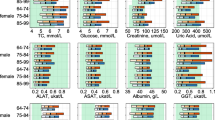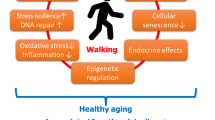Abstract
This study aimed to clarify the association between calorie intake and cognitive function in community-dwelling older adults. A cross-sectional analysis was performed on the first-year baseline data of 1559 adults aged 70–84 years using population data from the Korean Frailty and Aging Cohort Study. We included 543 participants who participated in nutritional surveys and accurately responded regarding their daily calorie intake. Daily ingestion was measured using the 24-hour dietary recall method, and neuropsychological tests evaluated cognitive characteristics. Logistic regression models were utilized to calculate odds ratios (ORs) with 95% confidence intervals (CIs). The prevalence rate of cognitive impairment was 8%. Subjects with cognitive impairment mainly showed memory loss. After adjusting the confounding factors, participants who had less than the recommended intake were susceptible to cognitive impairment compared to those who that had the proposed intake (adjusted OR: 7.70, 95% CI: 1.01–58.45). We showed that lesser calorie intake than the recommended intake increases the ORs of cognitive impairment. We suggest that an adequate calorie intake protects against cognitive decline, and further studies are essential to investigate the influence of calorie intake reduction on the elderly before widespread application.




Similar content being viewed by others
References
Prince, M.; Wimo, A.; Guerchet, M.; Ali, G.; Wu, Y.; Prina, M. World Alzheimer Report 2015. The global impact of dementia. An analysis of prevalence, incidence, cost & trends. London: Alzheimer’s Disease International; 2015. World Health Organization. Available from: https://www.alz.co.uk/research/WorldAlzheimerReport2015.pdf. 2017.
Kelley, A. S.; McGarry, K.; Gorges, R.; Skinner, J. S. The burden of health care costs for patients with dementia in the last 5 years of life. Ann. Intern. Med. 2015, 163, 729–736. doi: https://doi.org/10.7326/m15-0381
Fiocco, A. J.; Yaffe, K. Defining successful aging: the importance of including cognitive function over time. Arch. Neurol. 2010, 67, 876–880. doi: https://doi.org/10.1001/archneurol.2010.130
Kaup, A. R.; Mirzakhanian, H.; Jeste, D. V.; Eyler, L. T. A review of the brain structure correlates of successful cognitive aging. J. Neuropsychiatry Clin. Neurosci. 2011, 23, 6–15. doi: https://doi.org/10.1176/appi.neuropsych.23.1.6
Baumgart, M.; Snyder, H. M.; Carrillo, M. C.; Fazio, S.; Kim, H.; Johns, H. Summary of the evidence on modifiable risk factors for cognitive decline and dementia: a population-based perspective. Alzheimer’s & Dementia 2015, 11, 718–726. doi: https://doi.org/10.1016/j.jalz.2015.05.016
Haslam, D.; James, W. Obesity Lancet. 2005, 366 (9492), 1197–209. doi: https://doi.org/10.1016/s0140-6736(05)67483-1
Martin, C. K.; Anton, S. D.; Han, H.; York-Crowe, E.; Redman, L. M.; Ravussin, E.; Williamson, D. A. Examination of cognitive function during six months of calorie restriction: results of a randomized controlled trial. Rejuvenation research 2007, 10, 179–190. doi: https://doi.org/10.1089/rej.2006.0502
Witte, A. V.; Fobker, M.; Gellner, R.; Knecht, S.; Floel, A. Caloric restriction improves memory in elderly humans. Proc. Natl. Acad. Sci. U. S. A. 2009, 106, 1255–1260. doi: https://doi.org/10.1073/pnas.0808587106
Fontana, L.; Klein, S. Aging, adiposity, and calorie restriction. JAMA 2007, 297, 986–994. doi: https://doi.org/10.1001/jama.297.9.986
Weiss, E. P.; Fontana, L. Caloric restriction: powerful protection for the aging heart and vasculature. American Journal of Physiology-Heart and Circulatory Physiology 2011, 301, H1205–H1219. doi: https://doi.org/10.1152/ajpheart.00685.2011
Stevens, J.; Cai, J.; Pamuk, E. R.; Williamson, D. F.; Thun, M. J.; Wood, J. L. The effect of age on the association between body-mass index and mortality. N. Engl. J. Med. 1998, 338, 1–7.
Bouchard, D. R.; Pickett, W.; Janssen, I. Association between obesity and unintentional injury in older adults. Obes. Facts 2010, 3, 363–369. doi: https://doi.org/10.1159/000322873
Deschamps, V.; Astier, X.; Ferry, M.; Rainfray, M.; Emeriau, J.; Barberger-Gateau, P. Nutritional status of healthy elderly persons living in Dordogne, France, and relation with mortality and cognitive or functional decline. Eur. J. Clin. Nutr. 2002, 56, 305. doi: https://doi.org/10.1038/sj.ejcn.1601311
Kuo, H.; Jones, R. N.; Milberg, W. P.; Tennstedt, S.; Talbot, L.; Morris, J. N.; Lipsitz, L. A. Cognitive function in normal-weight, overweight, and obese older adults: an analysis of the advanced cognitive training for independent and vital elderly cohort. J. Am. Geriatr. Soc. 2006, 54, 97–103. doi: https://doi.org/10.1111/j.1532-5415.2005.00522.x
Won, C. W.; Lee, Y.; Choi, J.; Kim, K. W.; Park, Y.; Park, H.; Oh, I.; Ga, H.; Kim, Y. S.; Jang, H. C. Starting construction of frailty cohort for elderly and intervention study. Annals of Geriatric Medicine and Research 2016, 20, 114–117. doi: https://doi.org/10.4235/agmr.2016.20.3.114
Shim, J. S.; Oh, K.; Kim, H. C. Dietary assessment methods in epidemiologic studies. Epidemiol. Health. 2014, 36, e2014009. doi: https://doi.org/10.4178/epih/e2014009
Ministry of Health and Welfare, The Korean Nutrition Society. Dietary reference intakes for Koreans 2015. Ministry of Health and Welfare. 2016.
Lee, D. Y.; Lee, K. U.; Lee, J. H.; Kim, K. W.; Jhoo, J. H.; Youn, J. C.; Kim, S. Y.; Woo, S. I.; Woo, J. I. A normative study of the mini-mental state examination in the Korean elderly. Journal of Korean Neuropsychiatric Association 2002, 41, 508–525.
Lee, D. Y.; Lee, K. U.; Lee, J. H.; Kim, K. W.; Jhoo, J. H.; Kim, S. Y.; Yoon, J. C.; Woo, S. I.; Ha, J.; Woo, J. I. A normative study of the CERAD neuropsychological assessment battery in the Korean elderly. Journal of the International Neuropsychological Society 2004, 10, 72–81. doi: https://doi.org/10.1017/s1355617704101094
Arnett, J. A.; Labovitz, S. S. Effect of physical layout in performance of the Trail Making Test. Psychol. Assess. 1995, 7, 220. doi: https://doi.org/10.1037/1040-3590.7.2.220
Bowie, C. R.; Harvey, P. D. Administration and interpretation of the Trail Making Test. Nature protocols 2006, 1, 2277. doi: https://doi.org/10.1038/nprot.2006.390
Banken, J. A. Clinical utility of considering Digits Forward and Digits Backward as separate components of the wechsler adult intelligence Scale-Revised. J. Clin. Psychol. 1985, 41, 686–691. doi: https://doi.org/10.1002/1097-4679(198509)41:5<686::aidjclp2270410517>3.0.co;2-d
Choi, H. J.; Lee, D. Y.; Seo, E. H.; Jo, M. K.; Sohn, B. K.; Choe, Y. M.; Byun, M. S.; Kim, J. W.; Kim, S. G.; Yoon, J. C. A normative study of the digit span in an educationally diverse elderly population. Psychiatry investigation 2014, 11, 39–43. doi: https://doi.org/10.4306/pi.2014.11.1.39
Kim, M. K.; Lee, W.; Kang, J.; Kang, J.; Kim, B. T.; Kim, S. M.; Kim, E. M.; Suh, S.; Shin, H. J.; Lee, K. R. 2014 clinical practice guidelines for overweight and obesity in Korea. Endocrinology and Metabolism 2014, 29, 405–409.
Oh, J. Y.; Yang, Y. J.; Kim, B. S.; Kang, J. H. Validity and Reliability of Korean Version of International Physical Activity Questionnaire (IPAQ) Short Form. Journal of the Korean Academy of Family Medicine 2007, 28, 532–541.
Team, R. C. R: A language and environment for statistical computing. 2013.
Petersen, R. C.; Roberts, R. O.; Knopman, D. S.; Geda, Y. E.; Cha, R. H.; Pankratz, V. S.; Boeve, B. F.; Tangalos, E. G.; Ivnik, R. J.; Rocca, W. A. Prevalence of mild cognitive impairment is higher in men. The Mayo Clinic Study of Aging. Neurology 2010, 75, 889–897. doi: https://doi.org/10.1212/wnl.0b013e3181f11d85
Mielke, M. M.; Vemuri, P.; Rocca, W. A. Clinical epidemiology of Alzheimer’s disease: assessing sex and gender differences. Clin. Epidemiol. 2014, 6, 37–48. doi: https://doi.org/10.2147/clep.s37929
Salthouse, T. A. Selective review of cognitive aging. Journal of the International neuropsychological Society 2010, 16, 754–760. doi: https://doi.org/10.1017/s1355617710000706
Hedden, T.; Gabrieli, J. D. Insights into the ageing mind: a view from cognitive neuroscience. Nature reviews neuroscience 2004, 5, 87. doi: https://doi.org/10.1038/nrn1323
Harada, C. N.; Natelson Love, M. C.; Triebel, K. L. Normal cognitive aging. Clin. Geriatr. Med. 2013, 29, 737–752. doi: https://doi.org/10.1016/j.cger.2013.07.002
Whiting, I.; Wythe, L.; Smith, A. D. Differential age-related processing limitations in recall and recognition tasks. Psychol. Aging 1997, 12, 216. doi: https://doi.org/10.1037//0882-7974.12.2.216
Yun, S.; Kim, H. J.; Oh, K. Trends in energy intake among Korean adults, 1998–2015: results from the Korea National Health and Nutrition Examination Survey. Nutrition research and practice 2017, 11, 147–154. doi: https://doi.org/10.4162/nrp.2017.11.2.147
Lee, L.; Kang, S. A.; Lee, H. O.; Lee, B. H.; Park, J. S.; Kim, J. H.; Jung, I. K.; Park, Y. J.; Lee, J. E. Relationships between dietary intake and cognitive function level in Korean elderly people. Public Health 2001, 115, 133–138. doi: https://doi.org/10.1038/sj.ph.1900729
Miller, S.; Wolfe, R. R. The danger of weight loss in the elderly. The Journal of Nutrition Health and Aging 2008, 12, 487–491. doi: https://doi.org/10.1007/bf02982710
Ryall, J. G.; Schertzer, J. D.; Lynch, G. S. Cellular and molecular mechanisms underlying age-related skeletal muscle wasting and weakness. Biogerontology 2008, 9, 213–228. doi: https://doi.org/10.1007/s10522-008-9131-0
Buch, A.; Carmeli, E.; Boker, L. K.; Marcus, Y.; Shefer, G.; Kis, O.; Berner, Y.; Stern, N. Muscle function and fat content in relation to sarcopenia, obesity and frailty of old age—an overview. Exp. Gerontol. 2016, 76, 25–32. doi: https://doi.org/10.1016/j.exger.2016.01.008
Darmon, P. Intentional weight loss in older adults: useful or wasting disease generating strategy? Current Opinion in Clinical Nutrition & Metabolic Care 2013, 16, 284–289. doi: https://doi.org/10.1097/mco.0b013e32835f503f
Chang, K.; Hsu, T.; Wu, W.; Huang, K.; Han, D. Association between sarcopenia and cognitive impairment: a systematic review and meta-analysis. Journal of the American Medical Directors Association 2016, 17, 1164. e7-1164. e15. doi: https://doi.org/10.1016/j.jamda.2016.09.013
Van Kan, G. A.; Rolland, Y.; Bergman, H.; Morley, J.; Kritchevsky, S.; Vellas, B.; Panel, G. A. Frailty assessment of older people in clinical practice expert opinion of a geriatric advisory panel The Journal of Nutrition Health and Aging 2008, 12, 29–38. doi: https://doi.org/10.1007/bf02982161
Ma, L.; Wang, J.; Li, Y. Insulin resistance and cognitive dysfunction. Clinica chimica acta 2015, 444, 18–23. doi: https://doi.org/10.1016/j.cca.2015.01.027
Acknowledgement
This research was supported by a grant of the Korea Health Technology R & D Project through the Korean Health Industry Development Institute (KHIDI), funded by the Ministry of Health & Welfare, Republic of Korea (grant number: HI15C3153) and a National Research Foundation of Korea funded by the Ministry of Education (NRF-2017R1A2B4012775).
Author information
Authors and Affiliations
Corresponding authors
Ethics declarations
Conflicts of Interest: The authors declare no conflict of interest.
Rights and permissions
About this article
Cite this article
Park, JM., Lee, J., Kim, Y. et al. Calorie Intake and Cognitive Function in the Elderly: Data from the Korean Frailty and Aging Cohort Study (KFACS). J Nutr Health Aging 23, 930–936 (2019). https://doi.org/10.1007/s12603-019-1249-z
Received:
Accepted:
Published:
Issue Date:
DOI: https://doi.org/10.1007/s12603-019-1249-z




